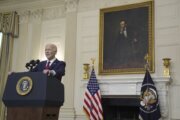Dana Gooley, special to wtop.com
WASHINGTON – Do you know where your clothes come from? Sure, your receipt might say Forever 21 or H&M, but chances are, the tag says otherwise.
What does “Made in Bangladesh,” “Made in Indonesia” or “Made in Vietnam” really mean? One D.C. woman is making it her mission to relay the high costs of cheap fashion.
Susie Taylor, a Bloomingdale resident and creator of The One More Project (or OM Project, for short), is working to bring attention to the bottom of the fast fashion supply chain — the factory workers.
Men and women who produce the products of fast fashion often work in unsafe conditions for a salary that is far below minimum wage. But recent tragic events, such as the Rana Plaza factory collapse, among others, are causing consumers to be more conscious about the line of labor involved in clothing production. And some of these consumers are opting to buy sweatshop-free clothes.
Curious to see how far consumers could trace their fashion purchases, Taylor and one of her employees recently polled shoppers outside of an H&M. What they found wasn’t surprising.
Shoppers confessed to not checking their labels and not knowing what went into the creation of their wardrobes. But Taylor’s not trying to shame them.
“You know, there’s a very common saying that if we were to do everything right, we’d all be naked and hungry — and there’s a good point there,” she says. “My recommendation is to shop where you have goods from local artists and you can possibly learn what creative process they went through to make it. Long story short, I think people, if they have a choice, they want to care,” Taylor says.
The OM Project hopes to create fair opportunities and empower female entrepreneurs through donations. Taylor’s goal is to turn “Made in Bangladesh” into a positive thing.
The OM model is smart: Pair an established, trustworthy manufacturer with a growing female entrepreneur and develop a mutually beneficial relationship between the two. The product is the OM bag, a large tote made of plant fibers and repurposed saris, handmade by Bangladeshi women working in fair, safe conditions. With the OM Bag, which sells for $200 on the project’s website, Taylor and the OM Project hope to topple the industry’s unbalanced pyramid of profit.
To produce the bag, Taylor brought together Saidpur Enterprises and SourceFK, two Bangladeshi employers with a commitment to ethical business practices. Saidpur Enterprises has been operating for over 40 years, paying its workers a daily minimum wage, with the ability to earn more.
According to Taylor, Saidpur Enterprises has helped lift an entire generation of displaced refugees out of poverty.
“They went from living in refugee camps along the Indian border, to a generation where children are literally graduating with higher education degrees,” says Taylor, who has traveled to Bangladesh and seen the tragedy of factory life, firsthand. For her, the success of Saidpur Enterprises is uplifting.
Taylor says changing the business practices of bigger manufacturers is key to fixing the industry, and this change starts with the individual consumer.
“We have serious purchasing power together. This may be on the other side of the world, it may be an out-of-sight, out-of-mind thing, but if we handle ourselves well, we seek to find out what’s going on, we’ll realize that when we demand that artisan goods become more readily available they’ll become cheaper because demand for them will grow up,” Taylor says.
To help potential sweatshop-free consumers get started, Taylor says comparing clothes to food is the way to go.
“What I hope that people do this year is to start to conceptualize their clothing the way that we are beginning to conceptualize our food. You wouldn’t put hydrogenated oils and estrogen into your body all day, every day, if you knew what it was doing to you. Same thing — you wouldn’t put those threads anywhere near your skin if you knew where they came from,” Taylor says.
Follow @WTOP and @WTOPliving on Twitter.







